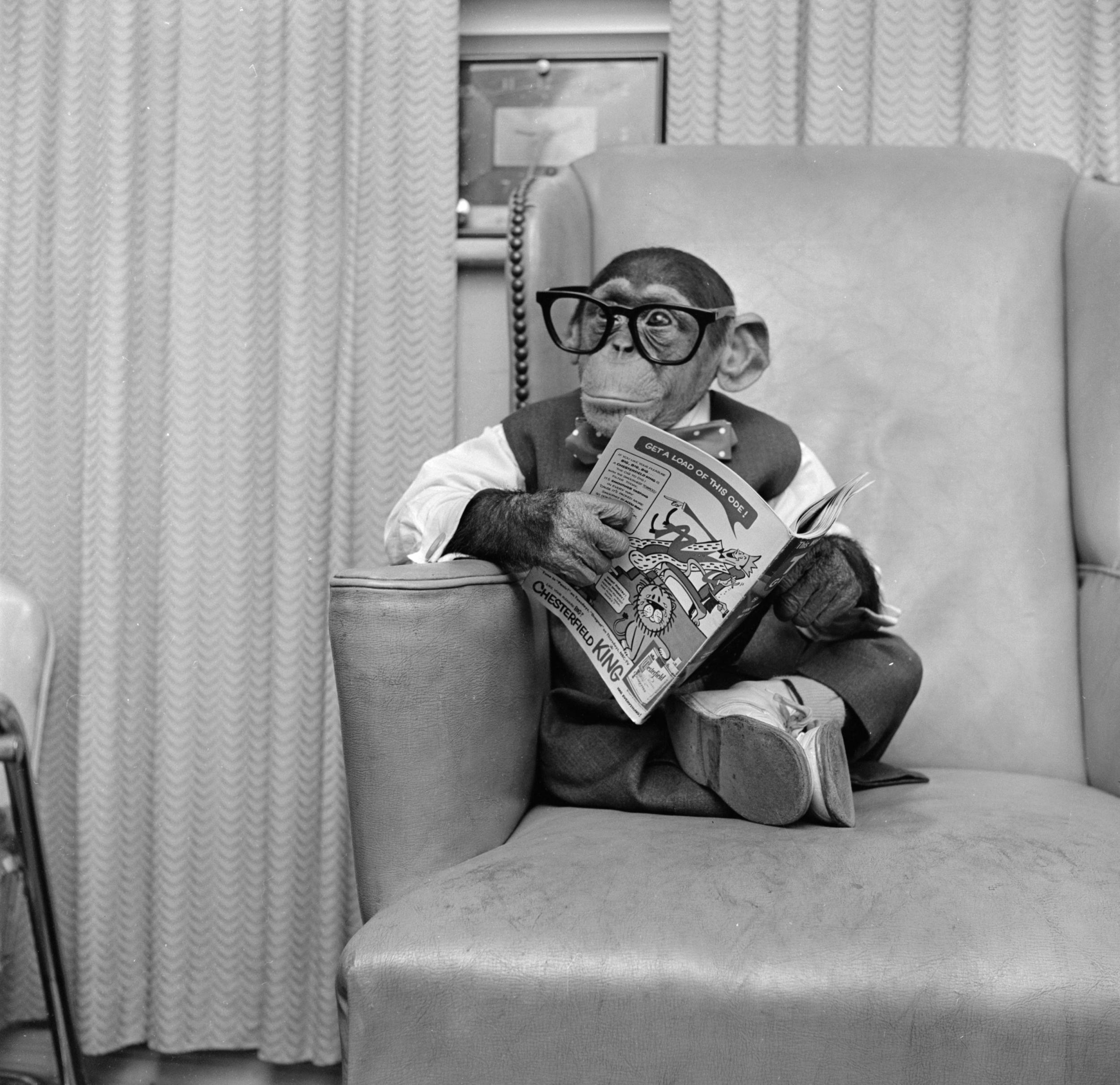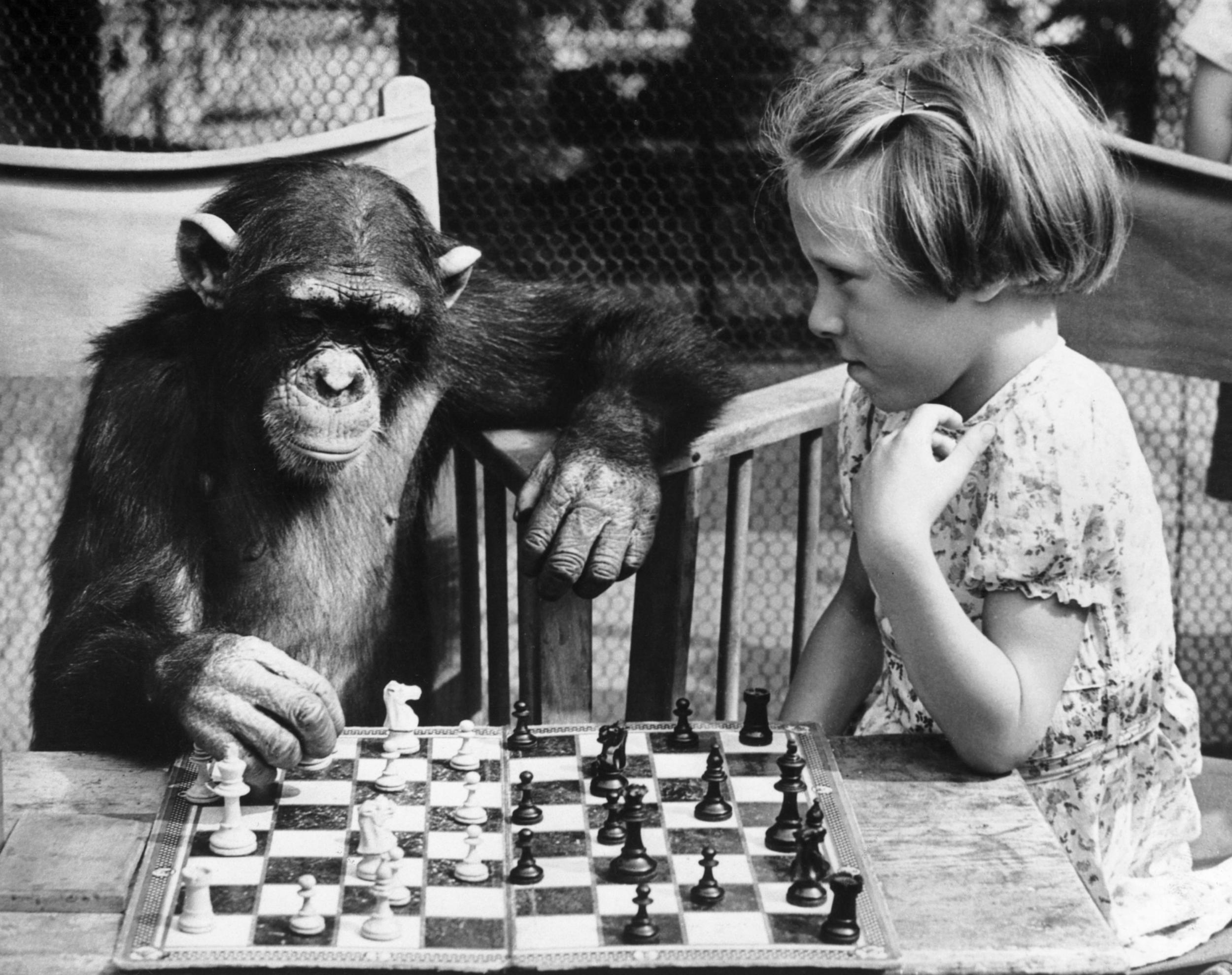12 science-backed tricks for appearing smarter than you are
Blind people with science

Some people are indeed born smarter than others — it's genetics.
But that doesn't mean you can't appear to look more intelligent.
In fact, there are plenty of science-backed ways to convince others that you're a modern-day Einstein.
We rounded up 12 of them, so you can impress everyone from your beau to your boss with your seeming brainpower.
1. Don't hold a beer.
People often do idiotic things after they've had too many drinks.
No wonder that even holding a beer can make you look less intelligent, according to a joint study by the University of Michigan and University of Pennsylvania.
"People who hold an alcoholic beverage are perceived to be less intelligent than those who do not, a mistake we term the imbibing idiot bias," write authors Scott Rick and Maurice Schweitzer.
In one of five experiments the researchers conducted, 300 managers saw photographs and read transcripts from a hypothetical dinner interview. Results showed that the managers perceived the candidates who ordered wine instead of soda as significantly less intelligent and less hirable.
2. Walk at the same speed as everybody else.
A study led by Boston University marketing professor Carey Morewedge found that if you walk faster — or slower — than the people around you, they might think you're stupid.
For the study, 49 undergrads watched films of three different people walking at either slower-than-average, average, or faster-than-average speed. Then they indicated how competent and intelligent that person appeared.
Results showed that people were perceived as smarter and more competent when they moved at the same speed as everyone else.
3. Put on thick glasses.

Research suggests that if you're wearing glasses, you'll appear less attractive but more intelligent.
In one small study, researchers at the University of Vienna had 76 participants look at 78 images of faces — some without glasses, some with full-rim glasses, and some with rimless glasses — and rate them on a number of traits, including intelligence and attractiveness.
According to the researchers' findings, people wearing glasses (rimless or with rims) were rated as more intelligent than people without glasses. Yet those without glasses were seen as more attractive than those with full-rim spectacles.
Go hipster, look smart.
4. Use a middle initial.
It'll make you seem intellectual.
"People's middle initials have a particular and powerful effect on how people are perceived by others," say psychologists Wijnand A.P. Van Tilburg of the University of Southampton and Eric R. Igou of the University of Limerick.
"The display of middle initials increases the perceived social status of these people," they write in the European Journal of Social Psychology, and it "positively biases inferences about their intellectual capacity and performance."
The researchers reached these conclusions by combining seven studies on middle initials. In one study, 85 students were asked to read an essay about Einstein's theory of relativity and rate it on quality. The author of the essay was presented with a range of names: "David Clark," "David F. Clark," "David F.P. Clark," and "David F.P.R. Clark."
As it turns out, "David F. Clark" outdid "David Clark," while "David F.P.R. Clark" received the most raving reviews.
5. Write simply.
Showing off your vocabulary has long been a go-to tactic for looking smart.
But verbosity can backfire.
A 2012 Princeton study — with the fitting title "Consequences of erudite vernacular utilized irrespective of necessity: problems with using long words needlessly" — found that clumsily using big words often causes people to think you're less intelligent.
In one of a series of experiments, researchers selected a sociology dissertation abstract with lots of long words and created a "simplified" version by replacing every word of nine or more letters with its second shortest entry in the Microsoft Word 2000 thesaurus. Then they asked 35 Stanford undergrads to read the dissertation and rate both the author's intelligence and how difficult the writing was to understand.
Results showed that the simplified version was perceived as less complex — and its author was judged as more intelligent.
6. Use graphs.
A 2014 study by Cornell researchers Aner Tal and Brian Wansink suggests that people are more likely to believe a claim if it "looks and smells" scientific, such as if it's accompanied by a graph.
In one experiment featured in the study, two groups of about 30 participants each read information about a new medication designed to fight the common cold. One group saw a bar graph to illustrate some experimental findings, while the other group didn't.
Results showed that 68% of the group who didn't see the graph thought that the medication would reduce illness, while a whopping 97% of people who saw the graph thought that the medication would do the same.
"The prestige of science appears to grant persuasive power even to such trivial science-related elements as graphs," Tal and Wansink write.
7. Speak expressively.
Monotone sounds dull.
"If two speakers utter exactly the same words, but one speaks a little faster and louder and with fewer pauses and greater variation in volume, that speaker will be judged to be more energetic, knowledgeable, and intelligent," writes Leonard Mlodinow, author of "Subliminal: How Your Unconscious Mind Rules Your Behavior."
"Expressive speech, with modulation in pitch and volume, and a minimum of noticeable pauses, boosts credibility and enhances the impression of intelligence."
8. Look people in the eye.
A 2007 study lead by Loyola Marymount University professor Nora A. Murphy found that looking your conversation partner in the eye can be huge for your perceived smartness.
In one experiment, 182 undergrads were divided into pairs. One partner in each pair was instructed to try to look smart and competent; the other wasn't given any instructions.
Then the researchers filmed the pairs discussing a preassigned topic for five minutes. Each partner rated the other on perceived intelligence.
When a panel of judges reviewed the recordings, they found that the students told to look smart employed a number of behaviors — but among the only behaviors that worked was looking your partner in the eye while speaking.
"Looking while speaking was a key behavior," Murphy wrote. "It significantly correlated with IQ, was successfully manipulated by impression-managing targets, and contributed to higher perceived intelligence ratings."
9. Dress smartly.
Studies have found that the clothes we wear shape the perceptions other people have about our capability.
For example, teaching assistants who wear formal clothes are perceived by students as more intelligent — but less interesting — than their casually dressed peers.
Plus, a 2012 Northwestern study found that people wearing white lab coats — as scientists and doctors are known to do — score higher on tests requiring lots of concentration.
"The clothes we wear have power not only over others," write authors Hajo Adam and Adam Galinsky, "but also over ourselves."
10. Smile.

Want people to think you're smart? Stop scowling.
In a 2014 study, researchers at Charles University in Prague recruited 160 participants to look at headshots of 80 students and rate them on traits including intelligence. According to their findings:
"There … seems to be a correlation between semblances of emotions of joy or anger in perceptions of high or low intelligence in faces, respectively. The 'high intelligence' faces appear to be smiling more than the 'low intelligence' faces."
11. Remove your facial jewelry.
Piercing your face may show how brave you are, but it won't do you any favors when you're trying to flaunt your IQ.
That's according to 2012 research led by Viren Swami, a professor at Anglia Ruskin University in the UK.
The researchers had 440 participants view photos of a man and a woman with different amounts of facial piercings and rate them on intelligence and attractiveness. Results showed that those with piercings were rated lower on both traits, and that those with multiple piercings were given the most negative ratings.
12. Be funny.
A solid sense of humor can be a sign of smarts.
In one small study, a psychologist asked three men to tell a joke to their friends at a bar while a woman sat at a nearby table. Then those men were instructed to approach the woman and ask for her number. After the man left, an experimenter approached the woman and asked her to rate the man on attractiveness and intelligence.
Results showed that the guys who told jokes were rated as more intelligent and attractive. Bonus: They were also three times as likely to get the woman's number as the men who didn't crack jokes.
Read more:
• EY says there is a massive 'void' in fintech: 'Is anyone actually using this stuff?'
• Here is all the money leaving China right now
• The Bank of England has banned and fined 2 former Co-operative Bank execs
Read the original article on Business Insider UK. © 2015. Follow Business Insider UK on Twitter.
Join our commenting forum
Join thought-provoking conversations, follow other Independent readers and see their replies
Comments
Bookmark popover
Removed from bookmarks